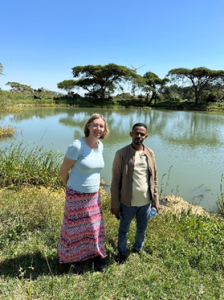By: Gerdien van Genderen – project lead Sustainable Water
I am visiting Fekadu. Fifteen years ago, Fekadu’s home in the heart of the Awash River Basin was a modest structure surrounded by sparse land. Today, it is a testament to the transformative power of knowledge and community effort in sustainable agriculture.
Fekadu’s journey began when he joined a Farmer Field School (FFS), a local initiative. The practical trainings are championed by SNV to educate farmers about advanced agricultural practices. The knowledge he gained there was not just theoretical; it was practical, empowering, and, above all, life-changing. With dedication and curiosity as his companions, he mastered the intricacies of crop spacing, the judicious use of chemicals, and the selection of high-yield varieties of tomatoes, onions, and cabbages. These skills were the seeds from which his flourishing garden grew.

Now, Fekadu’s household garden is a vibrant canvas of green, showcasing not only local varieties of cabbage but also a burgeoning variety of fruit trees. And with a little bit of support, he can improve even more. His furrow irrigation[1] method, diligently applied every 20 days, nourishes rows of mango, avocado, and banana plants. Although furrow irrigation is not the most efficient practise, it shows that while progress has been made, there’s still a journey ahead towards more sustainable water management methods, a journey that the Farmer Field Schools is willing to make in the future with the community. However, Fekadu’s mango trees have suffered from fungal attacks, a challenge stemming from an agronomic knowledge gap. Despite the availability of effective treatments like Superban, Fekadu’s lack of awareness has led to reduced yields.

But Fekadu is not alone in his quest for improvement. Abraham, the new bureau head of the Awash region office, advocates for a win-win approach. Through the FFS learning plot, he envisions an ecosystem where efficient water use is the norm, and farmers like Fekadu are supported to increase their productivity and income. For Abraham, it’s also about image building—instilling the value of water as a precious commodity, encouraging its judicious use, and building trust within the community.
Fekadu’s story is one of transformation and hope. Once a man with little to his name, he now stands proud amidst his fertile oasis, ready to share his knowledge with his five children—three daughters and two sons—and his community. The sweet taste of his home-grown sugarcane is not just a treat for the family but a symbol of the sweet success that comes from understanding and valuing the very essence of life—water. As one of the lead farmers in the current Farmer Field School, Fedaku’s role is pivotal. His plot is not a piece of land, but also a learning ground, a possibility for Fekadu to transform communal knowledge into communal wealth.
With a collaboration of experts and leaders like Abraham and organisations like SNV, there’s a collective vision of a future where water is not only valued, but also used with efficiency. As visitors to the Awash River Basin Platform, you’re invited to witness this remarkable journey of growth and resilience. Fekadu’s story is not just his own; it’s the story of every farmer who dares to dream and works to turn that dream into a reality.
[1] Surface irrigation where water is led through small channels or furrows that are drawn between crop rows. The water flows from one side of the field to the other by gravity, allowing the water to slowly infiltrate the soil and reach the root zones of the plants. Furrow irrigation requires precise planning and management to prevent over-watering and erosion.